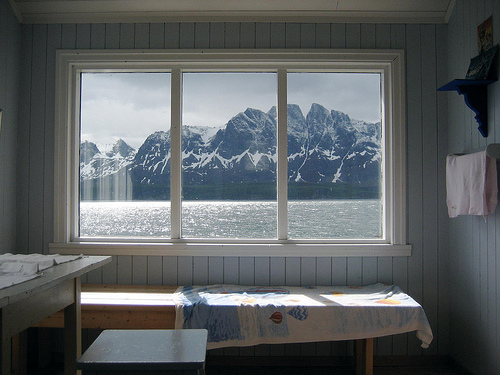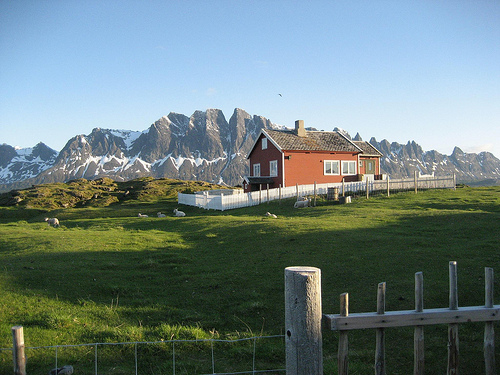
| « An Annotated Letter From Roman Polanski | The Great Legacy.com Swindle » |

Getting groceries means having to cross the 70th parallel, which fills me with an unjustifiable sense of regret. There's something glorious about being out and about in my shirtsleeves at 70ºN that loses all its savor down at 69º59'. Never mind that I am still north of all of mainland Canada, north of Alaska (except for a tiny sliver of the North Slope) and very much north of you. We draw arbitrary lines on the globe and then behave in ways that give them a ghostly reality. I didn't come all this way to be walking south!
But my stomach is rumbling, and a three mile walk southeast is the only way to get supplies on this island, population 43, where the room-sized grocery store operates more like an exclusive Parisian boutique, requiring you to ring the doorbell and wait for the yawning proprietor to come downstairs and let you in. Of course, since this is Norway, you then get to shop unmolested while he waits behind the little cash register.
Arriving on the island, my host and I foolishly leave our grocery bags and luggage on the beach for half an hour so we can go off to moor the boat. Birds are not stupid. I lose a package of cheese and some sliced ham; for him the damage is more serious, a tall can of stout punctured well below the beerline by a knowing beak. Dark foam is still oozing into the sand when we come back, and with great care we rush the wounded can into the main house like a fallen comrade. Beer is always precious, but it is so much more precious when replacing it means a ninety minute boat ride.
In their alcoholic frenzy, the birds have unfortunately overlooked a delicious bread of incredible density, bought at a bakery back in Tromsø. Perhaps its armored crust was just too much for them. Though modest in size, the providential loaf will last me for the entire week, and every day reveals some surprise ingredient—raisins, currants, whole apricots!—when I saw off another slice.

The island I am staying on is called Spildra, a little rectangular block of land about four miles long in the Kvænangen fjord in northern Norway. At these latitudes, if you build a farm, you get a dot on the map, and the homestead here is called Skaga. My host is an anthropologist named Ivar, who rents the cabin to strangers like me through an elegant little website. Ivar and his family divide their time between here and a house in Tromsø, about three hours away by boat, a university town of about 60,000. After a week on Spildra, Tromsø begins to feel like a metropolis of unimaginable immensity.
The grocery store is at a dot marked Dunvik. The amenities at Dunvik don't stop with just the shopping. There's electricity, a pier for the ferry, a breakwater, a road, and even a couple of public Dumpsters (which will be very welcome to me at the end of my visit). Both the shop and the little booth that serves as a post office display a handsome wooden sign with 'Store' and 'Post Office' carved out in Russian. This is the work of Ivar's friend Yuri, a prolific woodcarver and frequent visitor to the island. Yuri is one of those preternaturally handy people; the top shelf of the grocery store is lined with elegant little birds made of birch bark, which he sells there on commisison. He also built the very Russian cabin I'll be staying in for a week up at Skaga.
The cabin started out as a banya (Russian sauna), but it ended up looking so nice that Ivar couldn't resist the temptation to turn it into a guest house instead. The building retains the typical banya floor plan (a main room where you are expected to cool off and eat, a small room for steaming) but the hot stones and benches have been replaced by a pair of seriously comfortable beds. The only concession to the Norwegian location is the cabin's curious sod roof, unheard of in Russia but typical for this region. You lay down a layer of sod with the grass side down, and then you cover it with another layer grass side up and let it grow. The result is a warm, shaggy roof that waves in the breeze and occasionally even sprouts flowers. The sheep stare at it with longing.

"I find I sleep about five hours a night in summer," Ivar tells me over dinner my first night on the island. I nod in complete understanding, carry my precious loaf back to the cabin, and wake up twelve hours later. At no point in the week will I sleep fewer than ten hours, and on those days I'll feel groggy and require a fortifying nap. I try to play it cool and pretend like I am not spending half my vacation asleep, but my chimney betrays me. Ivar can see when the smoke starts rising around noon, and my feeble attempts to pretend that I enjoy four or five hours of brisk morning reading before firing up the wood stove fool no one.
Apparently the long hours of daylight and marine air do strange things to visitors. The sun will not set here until late July, and it orbits the sky in a tilted circle, shining high above the southern mountains at midday, and passing just above the northern horizon at midnight. When there are no clouds, it is a spectacular light show. Shadows stretch out into the distance, colors get warmer and warmer, and the nostalgic golden hour that I always associate with late summer afternoons lasts the whole night long.
But clear days are rare on Spildra, as if it were too much beauty for mortals to bear. Much more typical is fog or overcast, sometimes blowing in on a strong wind. On those cloudy days the light at midnight feels like dusk on a winter day, or the peculiar darkness just before a heavy thunderstorm. I can't read without lighting candles, or else holding my book right up against the window pane. There is a subconscious feeling like it is just about to grow dark, but of course it never does.
Life at Skaga is low-tech. The generator in the boathouse stays off unless there is a specific need. I may have found the one place in the world where I am out of range of the World Cup. The bathroom is a handsome A-frame outhouse decorated with official portraits of Norwegian royalty. Deposits collect in a steel drum that gets composted for two years and then goes onto the potato patch. There is running water from a spigot outside the cabin, brought down through a 900 meter long hose running up the cliffs to a nearby lake. The water is an unappetizing brown color from suspended rust, but tastes just fine. When the sun comes out for any length of time it warms the dark hose, and the water comes out at nearly body temperature. On cloudy days, scrubbing dishes chills the hands fast.
The easiest and most pleasant way to get clean is in the banya proper, which sits on a crag overlooking the open water and the little square beach. You feed the voracious stove with amazingly quick-burning little birch logs, and wait. Once the windows have fogged up you can enjoy the rare luxury of feeling excessively warm.
Most of the inhabitants on the island are sheep, who stay busy at their task of turning all of the grass on the island into slippery little piles of sheep shit. The adults have recently been shorn and look a little pitiful. The lambs are still small at this time of year and stay right by their mothers, whose sunken sides and full udders testify to the demands of parenthood. When a lamb wants to nurse it runs up to its ewe and head-butts her hard right in the udder, then kneels down on its front legs to suckle.
The sheep are a useful weather-gage. On dry or sunny days, they surround the main house and cabin, chewing placidly. When they disappear, you know it's about to get a little miserable. You can find them hiding in crags and overhangs further inland, waiting for whatever storm is coming through to blow itself out. When the weather eases a bit, they crowd in the lee of the boathouse, or try to fit under the little elevated hut used for fish-drying.

They have chewed the grass down to stubble length everywhere except the little rectangles of fenced-off land immediately surrounding the main house and cabin, which are still lush and green. The sheep stare at this with unspeakable longing. The smaller lambs have figured out that they can squeeze through the fencing, or sneak under it in places, and every once in a while a lamb will infiltrate the compound and enjoy sheep heaven for a few minutes until I come out yelling and scare it off into the wilderness.
The sheep get their revenge on me at night, when a well-timed ‘baa’ right outside the window, or a knock or two against the wall, can be quite startling, particularly on the nights when Ivar has gone and I am the only person on my half of the island.
Some of the sheep have grown used to getting a treat and will overcome their fear in order to slowly approach you and stare deep into your eyes with their strange barred pupils. For a moment, you experience a feeling of spiritual communion across the vast gulf that separates man from sheep, a strange feeling of being in communication with an utterly different mind. Then the sheep releases a terrific stream of urine. And, if you want, you can do the same.
| « An Annotated Letter From Roman Polanski | The Great Legacy.com Swindle » |
brevity is for the weak
Greatest Hits
The Alameda-Weehawken Burrito TunnelThe story of America's most awesome infrastructure project.
Argentina on Two Steaks A Day
Eating the happiest cows in the world
Scott and Scurvy
Why did 19th century explorers forget the simple cure for scurvy?
No Evidence of Disease
A cancer story with an unfortunate complication.
Controlled Tango Into Terrain
Trying to learn how to dance in Argentina
Dabblers and Blowhards
Calling out Paul Graham for a silly essay about painting
Attacked By Thugs
Warsaw police hijinks
Dating Without Kundera
Practical alternatives to the Slavic Dave Matthews
A Rocket To Nowhere
A Space Shuttle rant
Best Practices For Time Travelers
The story of John Titor, visitor from the future
100 Years Of Turbulence
The Wright Brothers and the harmful effects of patent law
Every Damn Thing
Your Host
Maciej Cegłowski
maciej @ ceglowski.com
Threat
Please ask permission before reprinting full-text posts or I will crush you.